Jehbco is committed to reduce our carbon footprint and making our products more sustainable. This is achieved by ensuring that there is minimal waste in the production process as well as ensuring that are products are made to last. Silicone is made of readily made resources and is a more environmentally friendly and sustainable option than more damaging products to the environment.
Articles posted by Jehbco Silicones
Silicone Extrusions in Aviation
Silicone’s excellent properties and versatile nature make it a valuable material in aviation. Silicone is able to operate under a wide range of conditions and Jehbco produces customised mixes of 100% silicone materials to meet varied specialised design requirements.
Jehbco’s silicone design and manufacturing capabilities provide light weight, easy to use silicone extrusion products which are an ideal choice for aircraft interior applications such as cabin floor and ceiling panels, baggage compartments and galleys. Silicone materials can conform to national and international standards for aircraft fire safety due to silicone’s fire retardant nature.
Jehbco’s silicone extrusions are able to provide a strong seal over a large pressure differential, making then a good choice for aircraft door and window seals. In addition, silicone has an extremely wide range of operating temperatures, from -50 ℃ to 230 ℃, and is UV and ozone resistant, making it suitable for sealing applications on external surfaces and for gaskets in engine and power plant systems. Silicone’s high dielectric strength (typically ⩾ 200 MV/m) makes it suitable for flexible electrical insulation. Additionally, Jehbco’s extrusions can be made to meet higher or lower temperature resistance and conductivity requirements that exceed the industry standards for general silicone extrusions.
Silicone Extrusions for Aviation and Aircraft Applications with Jehbco Silicones
For applications in confined spaces requiring minimal outgassing, Jehbco is able to produce Controlled Volatility (CV) silicone extrusions. These products are engineered to meet industry standards for low VOC.
The strength of adhesion between silicone and fibreglass resins such as polyester and epoxy is low making Jehbco extrusions an ideal product for fiberglass moulding.
Fluorosilicones for Fuel Applications
Traditional silicone materials exhibit low resistance to hydrocarbon fuels. However, with the addition of fluoro groups, our silicone’s excellent mechanical properties are combined with high hydrocarbon resistance. Jehbco’s fluoro silicones have the same high range of operating temperatures, insulation and fire retardant properties as regular silicone. In addition, fluoro silicones are resistant to damage from common aviation fuels. This combination of properties has made fluoro silicone a very popular material choice for gasket and O-rings applications in aircraft fuel systems and systems using fire-resistant hydrocarbon hydraulic fluids.
To learn more about Jehbco’s custom engineered silicone extrusions, Contact Our Sales Team.
Application of Silicone Adhesives
It’s normally not that hard to stick different material together, but when sticking silicone extrusions to different substrates, the only thing that can stick to silicone is almost always silicone.
This is where we often find non-silicone based adhesives fail. They generally lack this property unique to silicone and when failure occurs it can lead in-field leakage, warranty claims and not so happy customers.
We often get asked exactly why Silicone materials are resistant to glues and adhesives. It comes down to the fact of it having a ‘Low Surface Energy” in contrast to other materials.

Brick wall crack which can be repaired by Jehbco Silicones
This means that in short those molecules on a surface of Silicone say compared to standard wood glue are energetically less favourable than other materials. This means Silicone is quite resistant in its own right, making it a great sealing material for a range of applications.
The best adhesives to glue silicone to metal or plastic substrates are silicone-based adhesives. Silicone adhesive works by providing a strong, flexible bond between silicone parts along with high elongation.
Silicone rarely fails in application and in the instances it does, it’s quite often due to contamination of the adhesive. So before installing the silicone seals, it’s necessary to clean the application substrates with clean fabric and detergent.
A variety of detergents could achieve this including detergent with isopropyl alcohol. Use of detergents with lotions, waxes, fragrances, oils or creams is not advisable as then can often leave an invisible residue on the surface.
For example. interior grove walls with grease and/or oil present will need special attention for removal of contaminants. Quite often this will require cleaning with a solution of isopropyl alcohol with warm water and a ‘lint-free’ cloth.
Usage of primers is also another way of adding strength to the adhesion. By priming the surface of a silicone rubber, one can enhance the bond ability potential by changing the surface chemistry. Combined with certain adhesives the user of primers can be very effective.
It is noteworthy that primers normally expire within 18 months from the manufacture date, and if not stored as per manufacturer instruction (i.e. exposed to air/moisture), they can expire prematurely and this is noted by the liquid becoming milky.
Dow Corning 1200 OS Primer Clear – Bearing Distributors
A common primer is Dow Corning 1200 OS Primer Clear which can be purchased from Bearing Distributors (61 2 9822 5806). It works well with common silicone-based adhesives such as Silastic 747. It’s important to follow the standard process listed below to prime and apply adhesives to achieve a strong adhesion:
1. Selection
Before you commence the job, it’s critical to work out exactly the materials you need. This may include the cleaning fluid, primer, the wet liquid silicone and of course the solid silicone profile piece.
2. Cleaning
Clean both surfaces, silicone extrusion as well as the frame. Isopropyl alcohol-based detergents works well for cleaning. The premier itself is also a good cleaner!
3. Priming
When both surfaces are cleaned, prime both surfaces (by wiping or spraying). It’s important to let the primer to dry (aka flash) before applying the adhesive.
4. Adhesion
Apply silicone adhesive onto the supporting surface and lay the silicone extrusion onto the adhesive and press it so the adhesive gets evenly distributed in between.
5. Clamping
Clamp the two substrates together for minimum 2 days so the adhesive cures. It’s important not to put too much clamping force; otherwise the sealant would walk away from between substrates. 0.5mm adhesive is the minimum thickness to achieve a strong adhesion.
6. Testing
Once you have removed the clamps, it’s critical to test the strength of the adhesive bond. We recommend the ‘Pull Test’ which is simply pulling the silicone with reasonable strength to see that it holds up. If it comes off there may have been problems with the cleaning or product – if it remains, chances are you have a safe and stable seal.
To learn more about Jehbco’s silicone rubber and suitable adhesives, Contact Us right here.
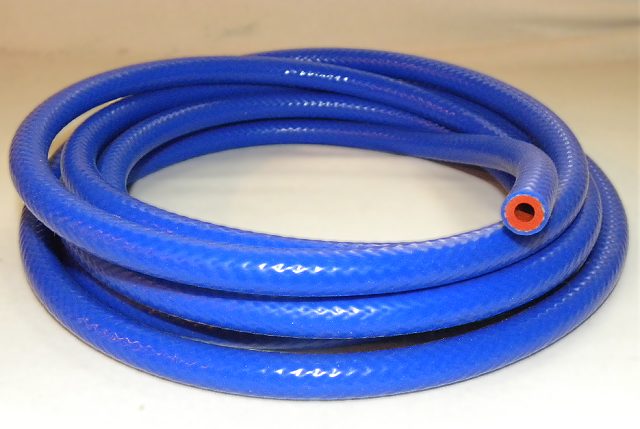
Importance of Heat Stabilizing Additives to Silicone
Stabilizers are used to maintain the polymer’s appearance, strength, toughness and flexibility, so as in keeping the performance of the polymer’s existing attributes. Whereas for construction products made of polyvinyl chloride, heat stabilizers are commonly used as window profiles, cable ducts and pipes. But due to heavy metal content, the effects of stabilizers for polymers in the environmental are indeed very disturbing.
Heat is the common weakness of plastics despite its versatility and usefulness as compounds. PVC famous polymer benefitting from the heat stabilizer additives, generally used in many applications such as a construction material, in medical devices, children’s toys, as housing protection for delicate cables and wires, and even in credit cards. However, PVC is also susceptible to heat damage. Several functions must be satisfied by heat stabilizers in PVC that include neutralizing hydrogen chloride, to replace frail carbon-chlorine bonds, and preventing oxidation.

Jehbco Silicones Heater Hose
Ultimately brittleness, hardness and glassiness happen to non-stabilized material while the stabilized material keeps its flexibility and extendable attributes. Although both stabilized and non-stabilized silicone rubber loss physical properties with undisrupted high temperature aging time, but the rate and degree of wearing down was far greater for the non-stabilized samples as compared to the stabilized specimens. Accordingly, blends of stabilizers are used to protect the polymer at various stages throughout the polymer lifecycle.
For many years thermal stabilizers such as cerium oxide, titanium dioxide and iron oxide are being used in silicone rubber compounds in order to prevent the loss of elasticity of such compounds as they age at heightened temperatures.
A principle that is often applied to estimate the practical life of silicone and other elastomeric material is the maturity required to cause the material to lose one-half of its initial elongation. Consequently, a more effective thermal antioxidant for silicone rubber materials has been found, like for instance what has been added to Jehbco silicone rubber would create a large positive effect on their maturity life under elevated temperature.
Indeed, the silicone elastomer additives not only slow down the degradation process of its physical property but they also reduce the generation of environmentally unwanted sewage discharge, which are harmful to the long-term memory of elastomer properties.
For more information about Jehbco silicone rubber heat stabilizers, visit the website and Contact Us right here.

Silicone Material Resistance to Low-Temperature
Low temperature applications are common in industries like: pharmaceutical, food production, brewing, chemical, refrigeration, automotive, petroleum, textile, electronics and aerospace. Low temperature performance is one of the most overlooked properties in seal performance. Exposure to low temperature can contract elastomeric materials, resulting in decreased compression and possible leakage and when lower than their design limit, seals become less flexible and brittle.
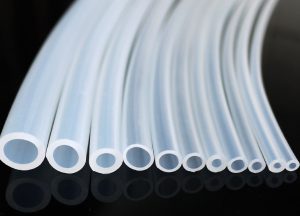
Jehbco Silicones JHS clear tubing, FDA approved
A cryogenic seal or otherwise called mechanical seal having a temperature below 0 degrees Celsius. There are series of issues occur for conventional mechanical seals using low temperature products that include being less likely corroded cryogenic fluids but are toxic and are enumerated under the section on “safety and environmental issues”. Almost always low temperature application will be too low for conventional seals. Unless otherwise, an alternate sealing method will be chosen to design a seal which in most cases elastomer take the top spot.
Most of the time cryogenic fluids are poor lubricators, in which mechanical seals successfully rely on the fluid film creation that will now precede issues with conventional mechanical sealing. This can lead to “slip stick” vibration problems where common resolution ended up getting the right materials to use. Consequently during extreme cases cryogenic seals and components needed to be dried first prior to seal installation due to the presence of a lubricant or moisture. This can lead to seal faces shearing or shattering during start-up of machinery.
Furthermore, cold applications freeze any moisture in the surrounding area hence mechanical seals connect the sealed fluid and atmosphere. Which obviously anything within the seal not immersed in the fluid freezes, this happen on mechanical seals with springs outside of the sealed product. Another tendency will occur where the rotating and stationary components are intact, for instance the clamp ring and the gland. On such cases immediate attention is required on face design and / or holder materials of construction to prevent loose or holder distortion.
Due to the earlier mentioned failure applications, study and research continues and it come across the discovery of silicone rubber being able to resist high and low temperatures way better than organic rubbers. Without noticeable change in its properties, silicone rubber can be used with no limit and can excellently withstand cold temperatures. When comparing silicone rubber from organic rubbers, the earlier stay elastic at lowest temperatures when organic rubbers become brittle.
Moreover with silicone rubbers water absorption to roughly 1% only, it can be immersed in water (cold water, boiling water, warm water) for a long time but without significant change on its electrical properties or mechanical strength. Solid silicone sheet rubber’s low temperature flexibility still tops any other elastomer as it remains functional even at lowest temperature. Gaskets and cushioning pads are readily fabricated from solid silicone rubber sheet material. Elastomeric fabrication capabilities counterpart: adhesive lamination, die cutting, water jet cutting of prototypes, slitting to width and production components.
Accordingly, the operating temperature ranges of silicone elastomers are wider than most organic elastomers. Solid silicone rubbers are proven to be more resistant to degradation, do not become soft and irreversibly deform when subjected to low temperatures, naturally flexible at low temperatures which organic elastomers cannot and lastly, can withstand compression set.
For more information on how Jehbco solid silicone rubber reacts to low temperature, browse the website and Contact Us right here.
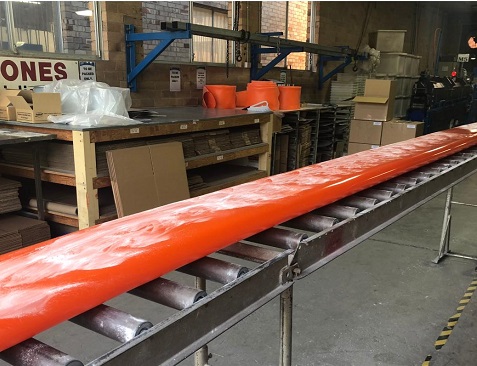
Is Jehbco’s 10″ Silicone Sleeve Ideal for Corona Treatment?
In order to achieve effective printing on plastic substrates, corona surface treatment is essential. The printing industry continues to seek for reliability and flexibility with corona treatment. Applications that don’t frequently change and without down-time but offer the handling and financial benefits of the sleeves are important factors being considered.
With treating corona the goal is to elevate the material’s surface energy providing its adhesion and wettability. However, the system not properly run and maintained is ineffective in treating a substrate.
There are series of problems that can happen when a system for corona treatment conveys too much or too little energy to a substrate. Problems started to occur after a usage of excessive amounts of ink aiming to cover up an inadequate treatment level resulted from an attempt to achieve satisfactory printing results using undertreated materials. Overtreatment can also result to ruining the material itself and to having blockage issues at the same time.

Corona Sleeve
Whereas low dyne levels, poor adhesion and inadequate wettability can at the same time happen. Whilst the increasing demands of U.V. and water-based inks, concurrence with polyethylene and polypropylene are causing corona treating a critical part of the converting process. Failure in corona treatment will cost so much time and money that can eventually jeopardize a printing business. Some troubleshooting information, preemptive measures and correct choice of material are important for corona treaters.
The material type, suppliers and thickness are all significant which can affect the appropriate power level. Prior to addressing corona treater issue, it is essential to consider vital parameters in choosing the material to use as corona sleeves such as dielectric constant and strength, ozone resistance, cut resistance, heat dissipation, porosity, ease of field repair, maximum service temperature, hardness and cost.
Here at Jehbco, our silicone sleeve manufactured from silicone rubber compound provides outstanding electrical, chemical and thermal resistance, making it ideal on harsh environment like during the corona treatment process. Jehbco silicone sleeves are manufactured specifically as electrical dielectric sleeves, and are produced with extreme maximum tolerance, seeing to it reliability and consistency in its performance.
Jehbco silicone sleeve do not crack or break under weird web tension; need much lower web tension; sleeve treat are functional with much smaller air gap; easy to replace; having good electrical insulation; withstand ozone corona discharge; ideal for continuous operation at high temperature without loss of any dielectric and mechanical properties; with high dielectric strength; resilience and flexibility on insulation case on to treatment roll and long life.
Consequently, our silicone sleeve for corona treaters are excellent material to use, since ours at Jehbco are chemically stable with excellent dielectric properties and chemical resistance, formulated for maximum resistance to ozone and corona discharge. Jehbco corona sleeving has been extruded perfectly elliptical. This ensures longevity and smoothness in application with no unnecessary “bumps” during operation.
For more information about Jehbco silicone sleeve for corona treaters, visit the website and Contact Us right here.
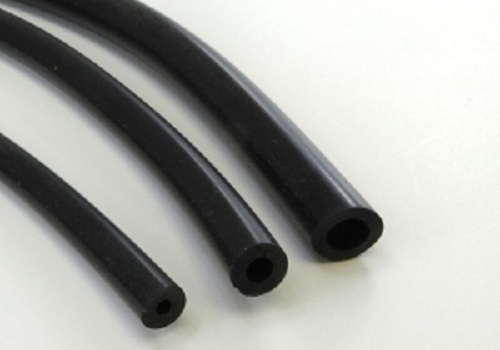
Silicone as an Ideal Vacuum Hose
Vacuum Tubing is a non-braced forced out construction of silicone rubber. Generally used in the following applications: virtually any non-pressured or vacuum application and vacuum connections where elevated temperatures or maximum working conditions occur. And being commonly used in Aerospace, marine wet –exhaust, performance motors and vehicles, agricultural and off highway vehicles, commercial truck and bus induction and cooling systems, all turbo diesel applications, food and beverage connections and general manufacturing industries globally.

Vacuum Hose Extrusion
What normally fit to replace rubber hoses and all small pipe line applications in particular the likes of washer bottle pump installations and vacuum tubing are extruded silicones. Accordingly a silicone vacuum hose with multi-function purposes has been developed suitably for vacuum gauges or low capacity fluid (water only) transfer. Silicone hose compatibility with coolant is indeed proven already, however, silicone hose compatibility with fuel or oil is debatable or definitely a mismatched.
Standard silicone hose products are absolutely not advisable to use with pressurized oil or fuel. In general because of the higher price of silicone tubing, its usage is only recommended but limited to applications where it will not be contaminated by resin. For temperature cure vacuum bagging and resin infusion in immediate surroundings, it is typically recommended to use less expensive and disposable PVC vacuum hose for the resin and vacuum supply lines concerning that if they get contaminated by resin they can be easily disposed.
More the less because of the high performance of silicone vacuum hose, it is still the most recommended means of connecting a vacuum equipment for resin infusion, vacuum bagging and pre-impregnated composites manufacture.
In addition, compared to PVC hose the silicone hose will not collapse and soften at elevated temperatures making it an ideal selection for vacuum bagging where the components are normally oven cured such with pre-impregnated composites or with high temperature post-cure on vacuum bagged or resin infused projects.
As expressed, silicone hose like that of Jehbco has been proven and tested already of its durability over PVC hose, the fact that it is hard to crush and its shape will spring back after being crushed making it a very durable solution for hosing purposes. Beside the fact that Jehbco solid silicone rubber can also withstand chemicals and resins do not stick to it.
Overall silicone hoses’ strength, toughness and flexibility are proven fact already over typical rubber hoses. For this reason, a silicone hose is an ideal choice for use in motorsport because of its outstanding performance that can also outlast conventional rubber type hoses. Thus, a silicone hose has multitude of uses such as turbo boost hoses, radiator pipes, air ducting hose, vacuum pipes, and can even carry fuel and oil using a specialized type of silicone hoses and more than anything else an excellent ozone and UV resistance.
For more information about Jehbco solid silicone rubber for vacuum hose, visit the website and Contact Us right here.
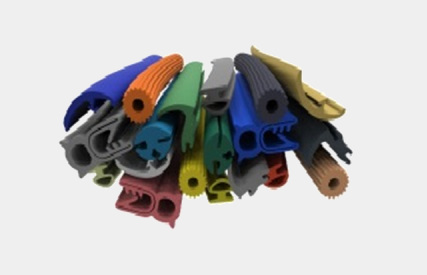
‘Compression Set’ & it’s Critical Use in Measuring the Life of Gasketing Material
Gaskets are a key seal used in anything from engines, to buildings to complex engineering systems. As we ‘live and breathe’ Silicone Elastomers 24 hours per day, 7 days per week – we keep an eye on parameters and properties of what we produce.

Compression Set gaskets
The lower the compression set is the better with Silicone Elastomers (particularly solid ‘rubber-like’ silicones) which include excellent resistance to chemicals, very low gas permeability, improved heat ageing, ozone resistance etc. This type of material is great for gaskets used in heavy sealing applications.
‘Compression set’ as a measurement is a reference to the permanent deformation of a gasketing material after removal of a compressive stress. Strong silicones in this regard are quite stable and can withstand extreme temperatures.
Weaker materials (such as those with a higher compression set) can be deformed over time. Let’s say it’s a sponge or foam gasket. At the start it may appear fine, however through opening & closing of the seal you can expect the gasket thickness to reduce over time. Once the gasket deforms too much, the seal can fail with dusts, fluids and contaminants passing through (especially a massive issue in the case of sensitive electronics).
Accordingly many more applications have shown that elastomer used for gasketing cannot last long and perform its purpose without having an excellent compression set. When an elastomer used as a gasket at a constant temperature, is applied with either static or dynamic load, followed by the removal of the load – the elastomer will recover towards its original shape if it has a low compression set.
It’s common to categorise the elastomers based on the base polymer used in the formulation. These classifications are summarized per the ASTM D 1418 standard below with an indication of how well they perform in terms of their compression set.
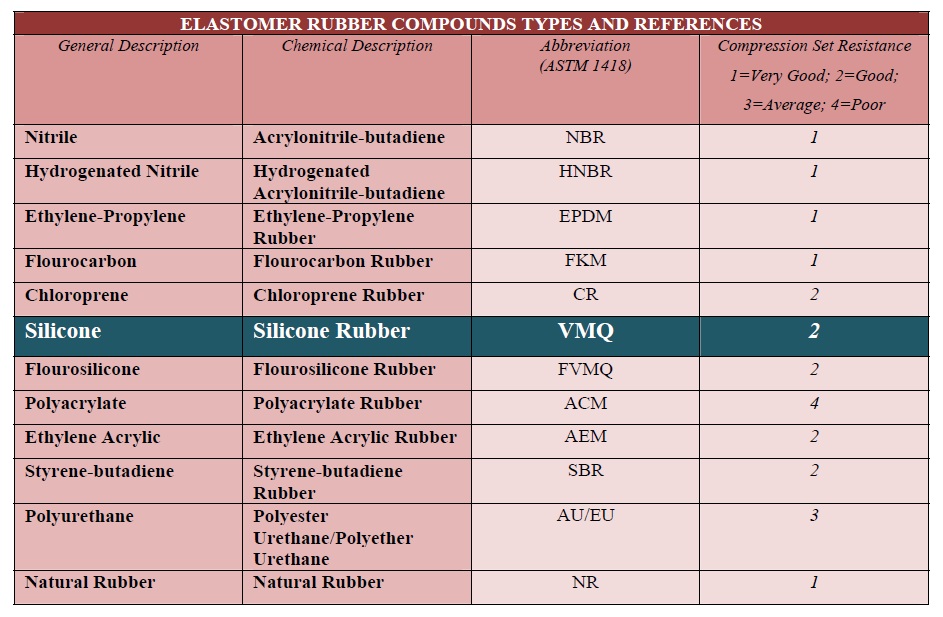
To find out more about Jehbco’s Pure Silicones, review the website and Contact Us right here.
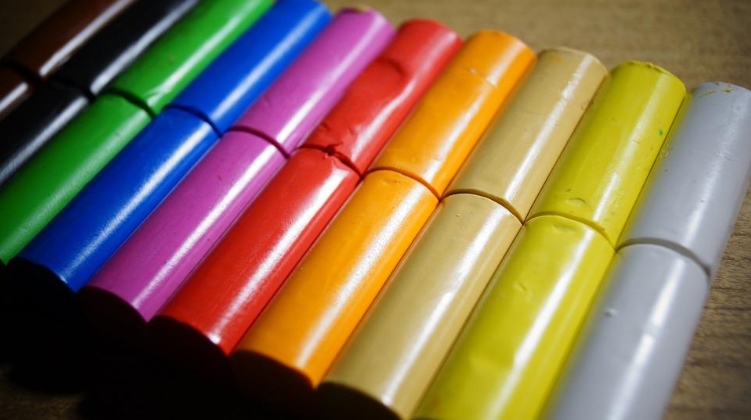
The Shelf Life of Pure Solid Silicones
This post details information about solid silicone rubber shelf life in comparison with other types of polymers.
Solid Silicone Rubber
Solid silicone rubber has a shelf life of 20 years and beyond when in proper storage depending on the grade. Products which have been in shelf longer than 20 years may still be very usable just like Jehbco’s 100% silicones.
Below is the summary of the age resistance data from both Military Standards and International Standards for rubber compounds most commonly used in International Controls rubber products. These numbers represent average shelf life under normal dry/cool storage conditions.
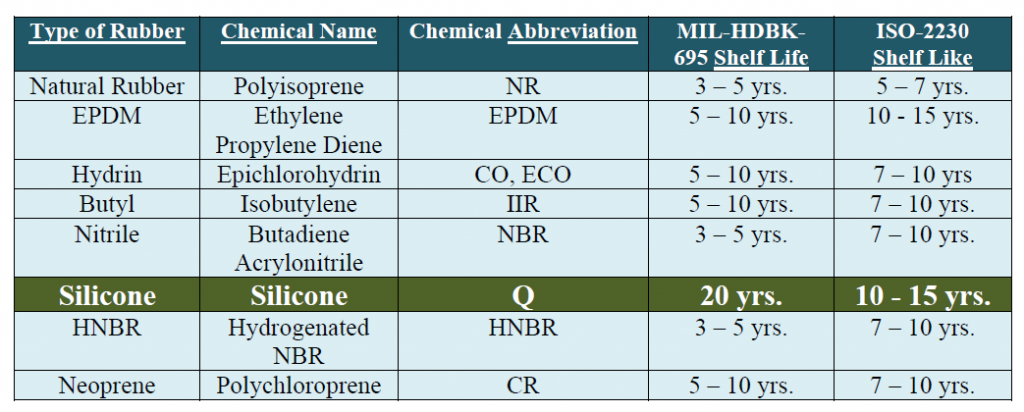
Below chart was issued by the Society of Aerospace Engineers as the Industry Standard for the aerospace elastomeric seals’ shelf life.
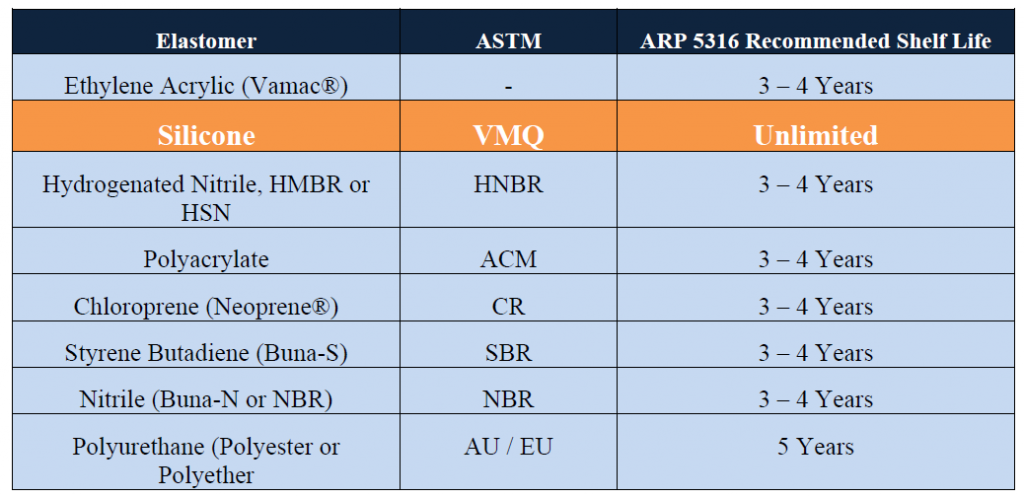
Solid Silicone Rubber
Rubbers that are made from 100% silicones like that of Jehbco shows excellent properties mechanically speaking over a very wide range in temperature and exhibits satisfactory performance to withstand oil. Solid silicone extrusions also have an outstanding low compression set.
Moreover, compared to other elastomers, silicone rubber is exceptionally pure and is therefore also suitable for use in the food, medical sectors and many industries. Pure solid silicone rubbers have quality, long-lasting range and durability.
To learn more about the functionality and advantages of using Jehbco solid silicone rubber, browse the website and Contact Us right here.
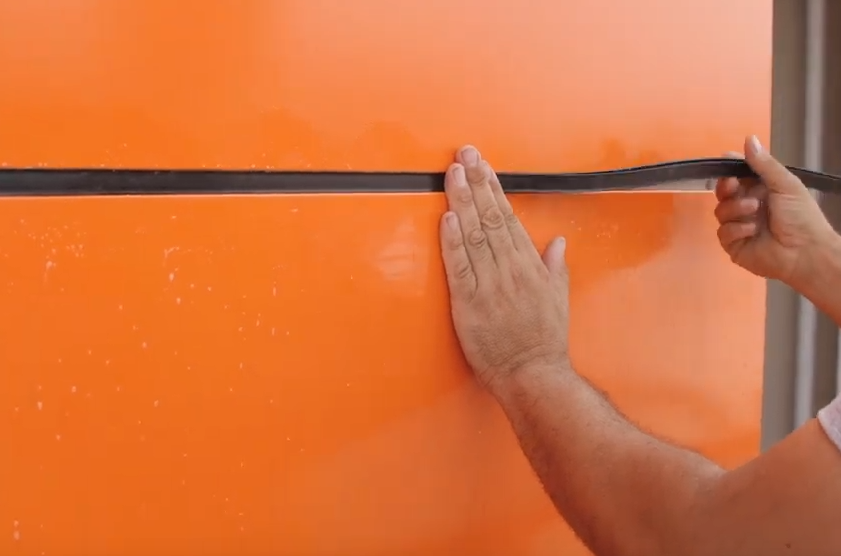
Bubbling and Unevenness of the Surface with Liquid Seal
The factors that extremely influence the service life of the installed sealant are its durability properties that include but not limited to the adhesion of a sealant to specific substrates and its aging characteristics, to withstand among others ultra-violet radiation, temperature, cyclic joint movement, moisture, bio-degradation, and movement during curing.
The liquid portion of the sealer evaporates after it transport onto the surface of the concrete’s solid portion due to most sealers with less than 100% solids either dry’s or cures. Fast solvent evaporation or immediate bubble formation occur as trapped solvent cannot evaporate into the atmosphere due to Low-VOC solvents evaporate quickly at the surface.
Outgassing, air in the void structures warms then expands because of concrete surfaces containing many capillaries and pores. Sealer that is still in a phase of malleability can “blow a bubble” under this pressure or expansion, commonly in deep recesses and joints. If the wet coating is too thick or over applied, it will trap solvent as the surface skins over.
Solar Energy, with no pressure a surface is warmer in the sunlight, increasing bubble formation. What is interesting is that an air movement, when a brisk wind can skin over a sealer faster than high temperatures, trapping solvent beneath the surface. Moreover, entrapped solvents cause the sealer to remain elastic for extended periods, making it more prone to delayed bubble formation.

Network Architectural
Having a good understanding of joint design, performance needed, substrates to be sealed, and the economic costs involved in the installation and maintenance of a joint sealant are also important in the proper application of a sealant and not only choosing a material with appropriate physical and chemical properties.
Properties of the sealant are at the same time determining factors that influence its performance in a joint that include modulus of elasticity, tear strength, its stress or strain recovery characteristics and fatigue resistance.
Jehbco’s solid silicone extrusions being used in expansion joints seals to prevent water, air and other environmental elements from entering or exiting buildings. They are specifically designed to provide water-proof protection that last long and at the same time with intense ability to withstand heat.
Often compared to wet sealants, solid silicone extrusion are installed faster and easier, eliminating the “Backing Rod an Filling With Sealant Technique” as a requirement for expansion joints seals, longer usability advantage with outstanding capability to withstand any types of weather conditions & UV that can get variety of colours for different applications.
To find out why Jehbco silicone rubber is the best sealant to avoid bubbling and unevenness on the sealed surface, browse the website and Contact Us right here.


